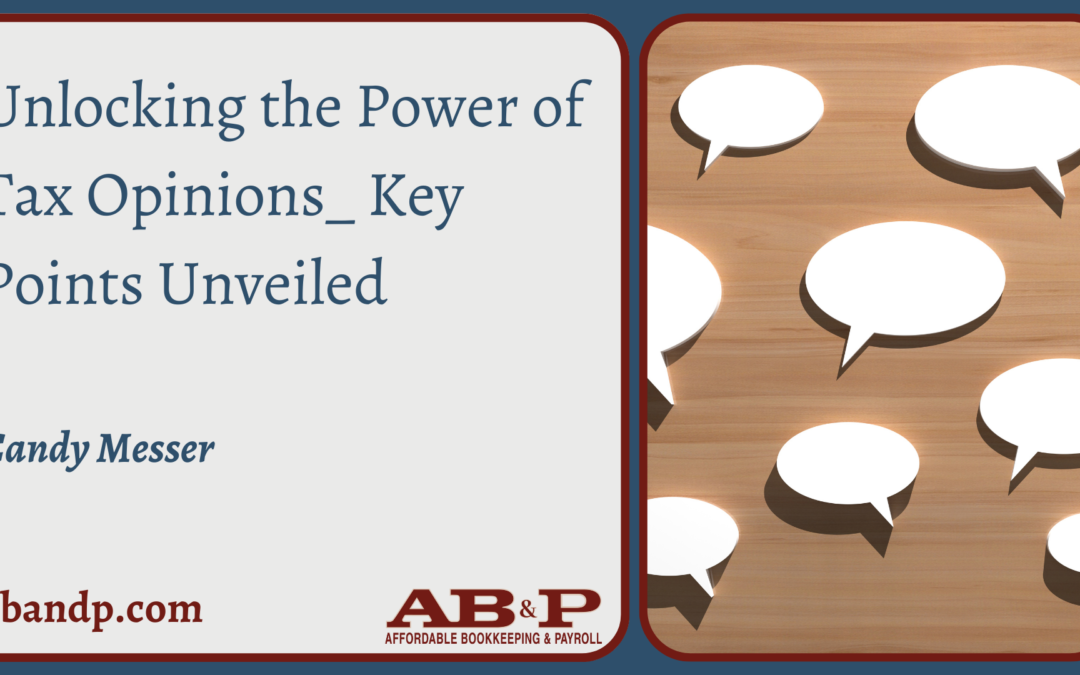Are you dealing with a tax issue that doesn’t seem cut and dry and you need guidance? In today’s video, I want to discuss the importance of getting a tax opinion. This is written advice on any transaction whose purpose is the reduction or elimination of any tax and must be written by a tax practitioner “knowledgeable in all areas of tax law.”
An article by Robert W. Wood in Forbes magazine shared key points that shed light on why you and your tax advisor might want to consider obtaining a tax opinion.
Point one: Tax opinions offer penalty protection. While many people believe this is the primary reason for seeking a tax opinion, it is actually just one aspect. You not only want to avoid penalties but also expect your tax position to be upheld. A well-prepared presentation thoroughly analyzes the facts, legal arguments, and relevant authorities.
Point two: Tax opinions evaluate your facts and apply the tax law. Of course, you will prefer an opinion that strongly supports your position. However, a reliable tax opinion should present a balanced assessment by examining both the positive and negative aspects of the relevant authorities. This ensures a comprehensive and unbiased analysis.
Point three: Tax opinions express the strength of your position. They are categorized into different levels of confidence, such as “Not frivolous,” “Reasonable Basis,” “Substantial Authority,” and more. Each level represents the likelihood of success in defending the tax position. It’s essential to understand these categories to gauge the strength of your position accurately.
Point four: It is crucial to obtain an opinion before an audit. Once you are under audit, there is rarely enough time to gather a well-thought-out opinion. Even if you manage to get one, its legal impact may not be the same as if it were prepared before filing your tax return. Therefore, it is best to seek a tax opinion well in advance, ideally in parallel with the transaction or event, to shape it effectively.
Point five: Tax opinions are valuable but should not be shared with the IRS. A tax opinion is a sensitive document protected by attorney-client privilege. It is crucial to carefully consider who receives it and to whom it should be disclosed. Copying others may inadvertently waive the privilege. The primary recipient should be the client, and precautions should be taken to ensure the privilege is maintained.
Point six: Opinions provide guidance to tax return preparers. While your tax preparer may not require the entire opinion, a concise directive letter stating that there is a written opinion protected by attorney-client privilege is usually sufficient. This helps avoid any temptation to share the opinion with the IRS during an audit. If needed, your CPA can be brought within the attorney-client privilege through a Kovel letter, ensuring seamless cooperation.
Point seven: Tax opinions are invaluable in disputes. Although tax opinions are rarely handed to the IRS, they serve as an excellent resource during audits or tax disputes. The best arguments and facts from the opinion can be used to craft persuasive letters or briefs targeting the issues raised by the IRS. By addressing the tax issues effectively, penalties may become a secondary concern.
And there you have it—the key points on tax opinions By understanding the importance of tax opinions, you and your CPA can navigate the complexities of the tax system more effectively, ensuring compliance and maximizing your chances of success. If you have any questions on this topic, be sure to speak with your tax preparer.
